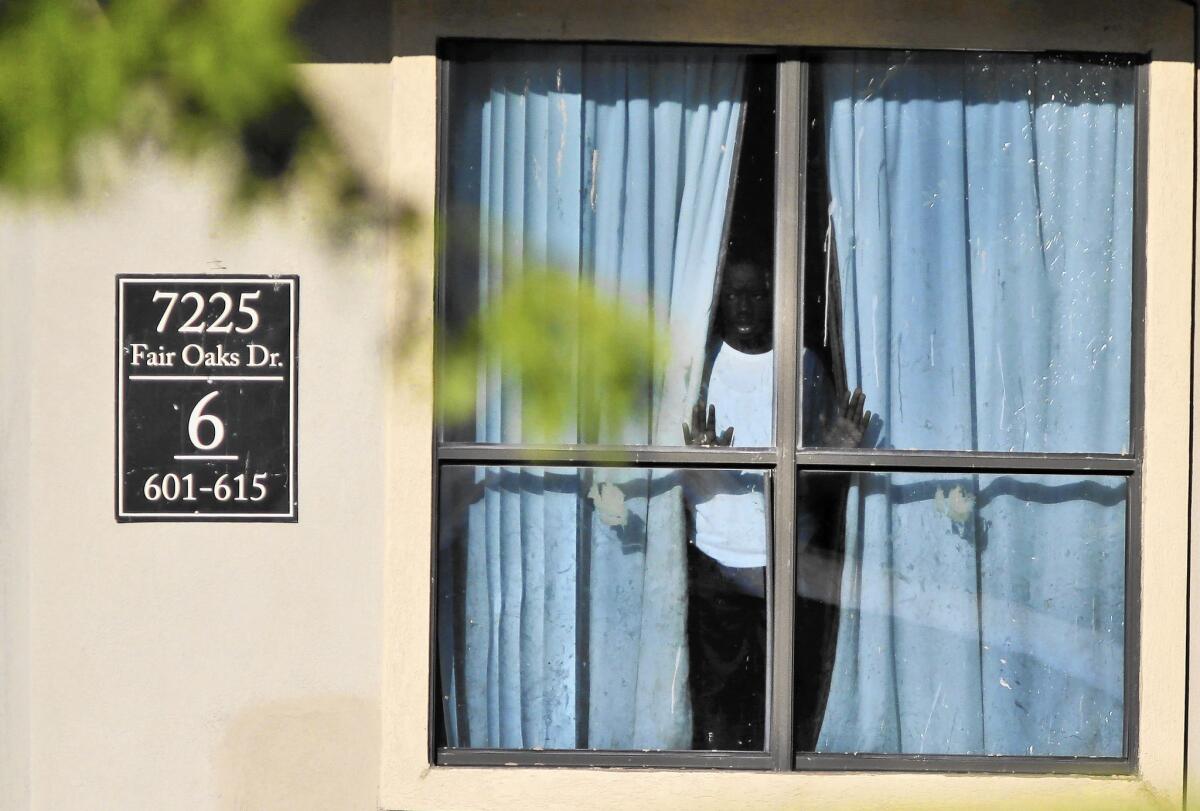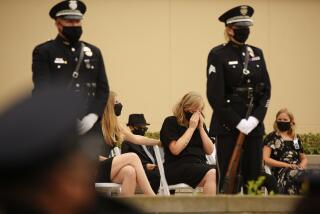Ebola patient’s family isolated by fear amid monitoring, confinement

- Share via
Reporting from DALLAS — Neighbors watch the apartment door of the Liberian family whose relative died of Ebola, and if someone emerges, adult or child, they run.
It doesn’t matter that the man who died, Thomas Eric Duncan, 42, never stayed with the family here, having arrived from West Africa about a week before he was hospitalized.
After Duncan died Oct. 8 and two nurses who treated him were diagnosed with Ebola this week, neighbors grew even more concerned. They stop repairmen who arrive at the complex, warning — incorrectly — that someone in the family’s apartment has Ebola.
When a man from the family leaves to fetch groceries in a minivan, even neighbors from Liberia familiar with the deadly virus shy away.
“People that used to hug him and shake his hand, they don’t anymore. If you do, they say, ‘Don’t you know they have Ebola?’” said Agnes Sayon, 20, who lives at the east Dallas apartment complex. Sayon, a factory worker from Liberia, is among the few who still socialize with the family.
The family, relatives of Duncan’s fiancee, are not quarantined and have been told they can leave their apartment at will. Two family members, Youngor Jallah and husband Aaron Yah, have stayed home from their jobs at local nursing homes voluntarily without pay. They have four children — ages 2,4, 6 and 11 — and plan to return to work Monday.
They are among 48 people who were being monitored, their temperature taken twice a day for 21 days from their last contact with Duncan when he was admitted at Texas Health Presbyterian Hospital in Dallas on Sept. 28.
The four people Duncan stayed with at a different apartment, including fiancee Louise Troh, 54, and her 13-year-old son, have been confined to a Dallas house at an undisclosed location by court order.
Their confinement is expected to end Monday, according to Dallas County Judge Clay Jenkins. One man finished the 21-day monitoring period Friday. By Monday, the remaining 47 will have finished their monitoring period. So far, none has showed symptoms.
“It’s going to be a great day for those 48 people. It’s just hanging over their head like a knife,” Jenkins said.
Children who are being monitored attend four public schools, and will be able to return to class Tuesday, Jenkins said.
Dallas City Councilwoman Jennifer Staubach Gates, who represents Troh’s neighborhood, said she’d heard that even residents who were not being monitored had had rocks thrown at their apartments. Others complained they had been turned away from businesses and their jobs. Gates said officials had contacted schools about increasing security Tuesday.
Troh’s pastor at Wilshire Baptist Church, the Rev. George Mason, said she did not wish to return to her former home, which has been decontaminated, along with her car. He was trying to arrange for a new apartment in her old neighborhood. “That’s where she lives and feels comfortable and where her people are,” he said.
On Friday, he was also arranging for security for the next few months, concerned that Troh might be harassed.
“I don’t know if there is a way to compensate for people’s hysteria,” he said.
The church benevolence fund has been accepting donations for the family. Most of Troh’s and her son’s belongings had to be destroyed during decontamination, Mason said, and the church has been racing to replace them by Monday.
“They have lost almost everything,” he said.
Reached Friday, Troh said she wasn’t sure when she would leave confinement. When she does, she said, she should not be treated like a criminal.
“I would like to go home and cry for my husband, to have my own private time,” she said, referring to Duncan.
Once she leaves confinement, she noted, she will not be “subject to orders” and neighbors should not monitor her.
“Why should they be watching my door? Why would they have problems with good people because of Ebola? We do not have Ebola,” she said.
Jallah, Troh’s daughter, speaks with her by phone daily and visited her last week, keeping a safe distance. “I told her we should pray to God that we should be together at the end of the 21 days,” Jallah said.
Jallah, 35, and Yah, 43, have been stigmatized not just by neighbors, but by landlords and businesses.
On Thursday, a Time Warner van pulled up to repair the family’s Internet service.
“All the people went to the window and ran to him and said, ‘They have Ebola!’ and he ran away,” Jallah said, adding that he left some of his equipment behind.
Another worker had to come finish the job. Still, she said, “he was afraid.”
The family’s refrigerator broke recently, and after Jallah contacted the landlord, she said, a maintenance worker arrived at her door with the key to another apartment — which he offered with double-gloved hands.
They wanted her to store the food in the refrigerator there. The unit happened to be vacant because the Liberian woman scheduled to move in Oct. 1 canceled after the Ebola scare.
Jallah refused, concerned someone might tamper with the food.
By Thursday, the food had spoiled, and all Jallah could do was throw it away and clean the refrigerator, which is still not repaired.
Confinement has taken a toll on the children. The 6-year-old, Rose, saw a news report about the first 10 days after exposure being the high-risk period. It was Day 8 for them. She asked her mother whether she was going to die.
When Duncan died on the 10th day, she asked again.
“I tell her we should just keep praying, we don’t have no option. We cannot run away from death,” Jallah said.
Her 4-year-old, King, pleads to go see his grandmother. When Jallah puts him on the phone with Troh, she promises that when she returns she will make him his favorite traditional Liberian dish — a spicy stew eaten by hand with homemade cassava dough called fufu.
Joe Joe, an 11-year-old sixth-grader, is old enough to recognize classmates and friends on television, and he talks to reporters outside his nearby middle school about the family’s fears.
No one from the school has contacted them about the transition.
Joe Joe worries what will happen when he returns to class Tuesday.
“I’m kind of nervous, because they might be afraid of me,” he said.
molly.hennessy-fiske@latimes.com
Twitter: @mollyhf
More to Read
Sign up for Essential California
The most important California stories and recommendations in your inbox every morning.
You may occasionally receive promotional content from the Los Angeles Times.











